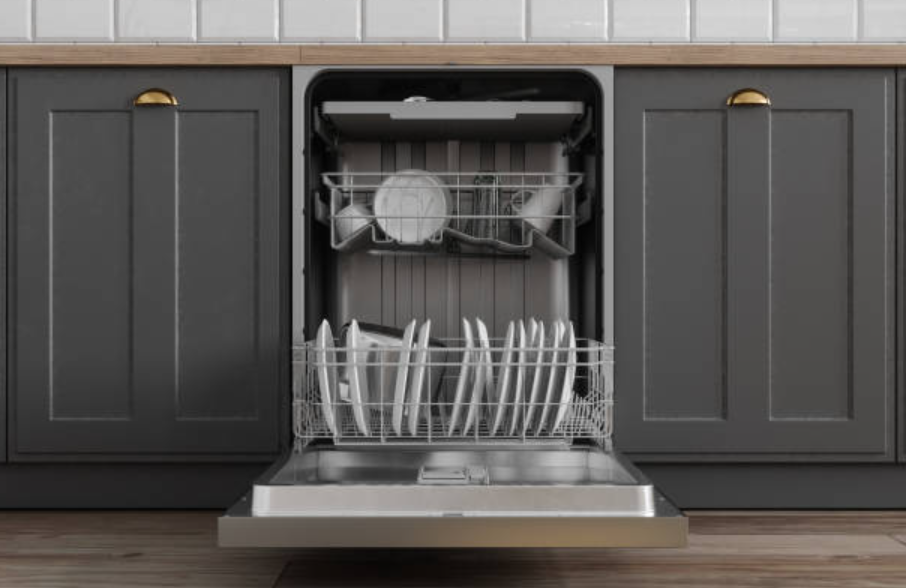
After a lovely Sunday roast with the family, there's nothing quite like being able to load up the dishwasher and let it work its magic. But if you're like many Australians, you might be making costly mistakes that are not only damaging your kitchenware but also adding unnecessary dollars to your bills.
Research shows that 58% of Australian households own a dishwasher, yet many of us are using them incorrectly - and it's costing us dearly. From ruined cookware to inflated energy bills, these common errors can hit particularly hard for those on fixed incomes.
In this Article
The expensive mistakes you're probably making
Your quality kitchen knives
While steel and ceramic knives won't tarnish in the dishwasher, the heat can make the blade more prone to dulling. It's better to wash them by hand to avoid having to sharpen them more often – and it will ensure they last longer and stay in great condition. Given that a decent set of knives can cost several hundred dollars, protecting this investment makes financial sense.
The same principle applies to blender blades, which can dull over time and make your smoothies less smooth.
Wooden items are dishwasher enemies
Wood is a natural, porous material that doesn't take kindly to the intense heat and moisture of a dishwasher cycle. The high heat will cause it to splinter and split, and any cracks are ideal breeding grounds for bacteria.
To keep your wooden cookware in top shape, hand wash with mild soap and water and dry them promptly. Avoid submerging them in water for a long time. A quality wooden chopping board can cost $50-100, so this simple care tip protects a valuable kitchen investment.
'The high heat of a dishwasher will cause wood to splinter and split, and any cracks are ideal breeding grounds for bacteria'
Non-stick cookware needs special care
Non-stick pans should be washed and dried by hand, as the dishwasher can wear down the non-stick surface over time. Your next omelette could be stuck to the pan if you don't stick to this advice. Quality non-stick cookware can easily cost $200-300, making hand washing a small price to pay for protection.
Crystal and delicate glassware
If you take all the right precautions, you can wash crystal in a dishwasher, but we wouldn't recommend it. Over time, abrasive detergents can mark and scar the crystal. Full-lead crystal is less dense than glass and scratches easily.
For those special pieces inherited from family or purchased for special occasions, the risk simply isn't worth it.
Metal cookware that doesn't play nicely
Copper pots and pans can lose their lustre in the dishwasher, while aluminium can turn black and cast iron can rust. Cast iron detergents can strip away the seasoning that gives cast iron its non-stick properties, and the moisture can lead to rust.
If you're not sure about a particular item, err on the side of caution and wash it by hand—especially if it's a prized Le Creuset or a family favourite.
Understanding dishwasher repair costs in Australia
When dishwashers break down due to misuse, repair costs can be significant:
• Exhaust/drainage problems: $240-$1,000
• Filter replacement: $50-$360
• Door latch or lock mechanism: $150-$310
• Motor or control panel issues: $400-$600
• Service call fees: Often $50-$100 before any work begins
Insulated bottles and travel mugs
The vacuum seal in insulated mugs and bottles is what keeps your drinks hot or cold. The dishwasher's heat can damage this seal, leading to leaks and poor insulation. Quality insulated bottles can cost $30-60, so it's worth checking the manufacturer's guidelines first.
Pressure cooker lids need special attention
While the actual pot of a pressure cooker can go in the dishwasher, a lid should always be hand washed. The high heat and water jets could damage the seal mechanism, making the actual pressure part of your pressure cooker obsolete. More concerning, it could make using your pressure cooker dangerous if safety mechanisms are compromised.
The surprising items that ARE dishwasher safe
Here's where it gets interesting - there are plenty of household items you might not have considered that can safely go through a dishwasher cycle, potentially saving you hours of scrubbing time.
Personal care items
You can wash hair and makeup brushes in the dishwasher to remove bacteria, makeup and buildup. Most cosmetic tools like nail clippers and tweezers are dishwasher safe. You can even wash plastic makeup brushes.
Your hairbrush can hold almost 3,500 colonies of bacteria, according to University of Arizona research. Remove any stray hairs and drop your brush in the silverware tray for a thorough cleanse. Just remember - only plastic brushes, not wooden or boar-bristle ones.
Cleaning supplies get a clean
Clean your cleaning supplies — plastic or metal dust pans, vacuum attachments and washable filters, for example — in the dishwasher. Place smaller items, like vacuum attachments, in the top rack. Larger items, like a dustpan, can go face down on the top rack.
The shelves in your refrigerator can get pretty dirty. But you can easily clean them in the dishwasher! Just remove them and put them on the top rack. Make sure to use a gentle cycle, and you should also double-check your manual to make sure they're dishwasher safe.
Kitchen odds and ends
It's easy to forget about cleaning the plate in your microwave, but it is essential. Lots of soups and other microwavable foods can bubble over, creating a mess that should not be overlooked. Your microwave turntable plate can go right in the dishwasher.
Stove knobs are one of those areas in the kitchen that tend to get greasy very quickly. Instead of painstakingly scrubbing off specks and smudges by hand, simply pop off the plastic components and wash them along with your dishes.
Children's items and toys
Germs can linger on your kids' toys for months. Disinfect them by putting them in a mesh lingerie bag on the top shelf of your dishwasher. Then just let the normal cycle run.
Babies are notoriously messy, and their toys can get pretty dirty. But you can wash many of them in the dishwasher! Check for a dishwasher-safe sign, and if you see one, you can go ahead and wash them.
Did you know?
Did You Know?
Your dishwasher can get as hot as 150 to 160 degrees Fahrenheit, dislodging stuck-on dirt and enabling thorough disinfecting. And you don't even have to use bleach or other harsh chemicals. This makes it excellent for sanitising items that get handled frequently.
The pre-rinsing myth that's costing you money
Here's a revelation that might surprise you: rinsing your dishes before putting them in the dishwasher actually won't make your crockery any cleaner and will just waste water.
Dishwashers have special sensors that measure how much gunk is coming off your plates during the wash cycle. A pre-rinsed plate can 'trick' your dishwasher into thinking it's cleaner than it really is, and the dishwasher will respond by dialling down the power, so your plates could come out dirtier, not cleaner. The best approach is just to scrape off any solids into the bin and just let your dishwasher get on with doing what it's designed for: cleaning your dishes.
The water waste is staggering. Scraping food residue from dishes instead of rinsing can save significant water. Rinsing can waste 2.5 gallons of water per minute, and most new dishwashers don't require it. You waste 6,000 gallons per year if you insist on pre-rinsing, Consumer Reports says.
For perspective on Australian usage: A standard, energy-certified dishwasher will use around 11 litres of water per washing cycle. Older appliances can waste up to 37 litres per cycle, while those built after 2013 tend to use around 18 litres. Compare that to washing the same amount of dishes by hand in a sink, which can waste up to 100 litres of water.
Smart dishwasher habits that save money
- Never pre-rinse - just scrape off food scraps
- Always run full loads to maximise efficiency
- Use the eco setting when possible
- Clean filters regularly to maintain performance
- Consider air drying instead of heated dry cycles
- Take advantage of delay start during off-peak electricity times
Australian seniors: your energy-saving advantage
If you're over 60 in Australia, you have access to some excellent energy rebates that can significantly reduce your dishwasher running costs.
The NSW Seniors Energy Rebate is available for eligible independent retirees to help cover the cost of their electricity. To be eligible, you need to hold a Commonwealth Seniors Health Card. From 1 July 2025, the NSW Seniors Energy Rebate amount is $200 per household per financial year.
Similar rebates are available across Australia, with the NT Seniors Recognition Scheme offering up to $500 per year to help with electricity, gas, phone and internet bills, as well as fuel, travel, and accommodation expenses.
The energy rating on dishwashers ranges from 1 to 6 stars. Every extra star could save you 30% on running costs. The more stars, the more energy efficient your dishwasher will be, and the lower the running costs.
The cost of electricity makes up the largest portion of dishwasher expenses, costing between 11.9c and 26.8c on average, per load. The amount of electricity used will depend on the size of the dishwasher, as well as the energy efficiency star rating.
Smart loading saves money
Running a half-full dishwasher will use far more energy and water per plate than running a full load. Plus, a half-full load won't dry as well as a full one. That's because the plates hold heat from the wash, and that heat is what helps the water to evaporate, leaving you with dry dishes. Fewer dishes mean less heat, which can leave you with wet dishes at the end of the cycle.
However, don't go to the other extreme. While shoving everything into the dishwasher seems rational because more gets cleaned at once ,it isn't the most effective method. Badly stacked items can block the dishwasher jets and detergent and you may find yourself re-washing things. If you stack with space between your dishes and cutlery, water can reach every surface and you'll get a more dependable wash every time.
It costs less to repair new dishwasher models because their parts are much easier to find compared to older models. If your dishwasher model is quite old and worn down, consider purchasing a new model instead.
The cutlery controversy settled
It's the domestic dispute that's raged since the dawn of the dishwasher – should your cutlery point up or down in the basket? Some argue it's up, up and away for a better wash, while their opponents play it safe and go down all the time. And then there are those who choose chaos and put them in any which way. There are pros and cons for each side, but our experts say down is the only way to go.
The safety argument wins here - sharp knives and forks pointing up pose a real injury risk when unloading.
What This Means For You
Proper dishwasher use isn't just about getting cleaner dishes - it's about protecting your investments, reducing your bills, and taking advantage of the rebates available to Australian seniors. By avoiding these common mistakes and embracing some surprising dishwasher-safe items, you'll save time, money, and maybe discover some new tricks that make household management easier.
What dishwasher mistakes have you been making, and which of these surprising dishwasher-safe items will you try first? Share your experiences and any other household tips you've discovered - we'd love to learn from each other's kitchen adventures!
10 common dishwasher mistakes: Are you making them? | CHOICE
Of course, once you've seen the water usage figures for dishwasher vs washing by hand, it all makes sense.
https://www.choice.com.au/home-and-living/kitchen/dishwashers/articles/common-dishwasher-mistakes
10 Things You Can Wash in the Dishwasher | Ortega's Appliance
Don’t worry about hand-washing those vacuum attachments.
https://www.ortegasappliance.com/blog/things-you-can-wash-in-the-dishwasher/
10 Things You Can Wash in the Dishwasher | Ortega's Appliance
You can clean them in the dishwasher, too!
https://www.ortegasappliance.com/blog/things-you-can-wash-in-the-dishwasher/
Say goodbye to ruined cookware: Simple dishwasher errors to avoid | YourLifeChoices
Wood is a natural, porous material that doesn’t take kindly to the intense heat and moisture of a dishwasher cycle.
https://www.yourlifechoices.com.au/...d-cookware-simple-dishwasher-errors-to-avoid/
10 Things You Can Wash in the Dishwasher | Ortega's Appliance
Just put it on the top rack and run a normal cycle.
https://www.ortegasappliance.com/blog/things-you-can-wash-in-the-dishwasher/
Say goodbye to ruined cookware: Simple dishwasher errors to avoid | YourLifeChoices
To keep your wooden cookware in top shape, hand wash with mild soap and water and dry them promptly.
https://www.yourlifechoices.com.au/...d-cookware-simple-dishwasher-errors-to-avoid/
10 Things You Can Wash in the Dishwasher | Ortega's Appliance
Make sure only to do this with plastic brushes, nothing delicate or with wood.
https://www.ortegasappliance.com/blog/things-you-can-wash-in-the-dishwasher/
10 Things You Can Wash in the Dishwasher | Ortega's Appliance
If you have pets, their bowls can get slimy and dirty really fast. Avoid dealing with it and just toss them in the dishwasher!
https://www.ortegasappliance.com/blog/things-you-can-wash-in-the-dishwasher/
10 Things You Can Wash in the Dishwasher | Ortega's Appliance
So next time you’re cleaning, don’t forget that you have more options than you think for cleaning some of your household items. And when you need qual...
https://www.ortegasappliance.com/blog/things-you-can-wash-in-the-dishwasher/
Save your kitchen tools—ditch these damaging dishwasher habits | YourLifeChoices
Copper pots and pans can lose their lustre in the dishwasher, while aluminium can turn black and cast iron can rust.
https://www.yourlifechoices.com.au/...tools-ditch-these-damaging-dishwasher-habits/
Say goodbye to ruined cookware: Simple dishwasher errors to avoid | YourLifeChoices
The detergents can strip away the seasoning that gives cast iron its non-stick properties, and the moisture can lead to rust.
https://www.yourlifechoices.com.au/...d-cookware-simple-dishwasher-errors-to-avoid/
Save your kitchen tools—ditch these damaging dishwasher habits | YourLifeChoices
If you’re not sure about a particular item, err on the side of caution and wash it by hand—especially if it’s a prized Le Creuset or a family favourit...
https://www.yourlifechoices.com.au/...tools-ditch-these-damaging-dishwasher-habits/
Save your kitchen tools—ditch these damaging dishwasher habits | YourLifeChoices
The vacuum seal in insulated mugs and bottles is what keeps your drinks hot or cold. The dishwasher’s heat can damage this seal, leading to leaks and ...
https://www.yourlifechoices.com.au/...tools-ditch-these-damaging-dishwasher-habits/
Should You Repair or Replace Your Broken Dishwasher? via @ConsumerReports
Many of those who didn’t cited the high cost of repair as a key reason they decided not to go through with it.
https://www.consumerreports.org/app...r-replace-your-broken-dishwasher-a9394720998/
Surprising Things to Clean in the Dishwasher | Reader's Digest
Most cosmetic tools like nail clippers and tweezers are dishwasher safe.
https://www.rd.com/list/surprising-dishwasher-items/
15 Surprising Items That Are Dishwasher Safe
https://learn.compactappliance.com/surprising-items-dishwasher/
15 Surprising Items That Are Dishwasher Safe
As long as they fit, you can avoid scrubbing hassle and awkward stooping by simply removing shelves and drawers and washing them in your home dishwash...
https://learn.compactappliance.com/surprising-items-dishwasher/
13 'Surprising' Dishwasher-Safe Items You Wouldn't Expect - Brit + Co
... Regardless of whether you're a container gardener or prefer growing plants in garden beds, your tools are exposed to dirt, bacteria, and, sometime...
https://www.brit.co/surprising-dishwasher-safe-items/
Surprising Things to Clean in the Dishwasher | Reader's Digest
Here’s how to load your dishwasher properly. ...
https://www.rd.com/list/surprising-dishwasher-items/
17 Surprising Things You Can Put in Your Dishwasher Safely
Place smaller items, like vacuum attachments (but not brushes or tools with fabric attached), in the top rack. Larger items, like a dustpan, can go fa...
https://www.goodhousekeeping.com/home/cleaning/a62153638/things-you-can-clean-dishwasher/
Surprising Things to Clean in the Dishwasher | Reader's Digest
When it comes to cleaning, common desk items like penholders and trays for scrap paper often get overlooked. If they’re metal or plastic, toss them in...
https://www.rd.com/list/surprising-dishwasher-items/
10 Unique Items You Can Clean in the Dishwasher (Besides Dishes) | Merry Maids
However, did you know your gardening tools also carry bacteria, fungi, and pesticides that could spread and damage your greenery? With your dishwasher...
https://www.merrymaids.com/cleaning-tips/diy/10-unique-items-you-can-clean-in-the-dishwasher-/
15 Surprising Items That Are Dishwasher Safe
Tiny grooves and miniscule dust motes can be tedious to wash by hand, and can cause serious irritation for those with allergies.Using a dishwasher is ...
https://learn.compactappliance.com/surprising-items-dishwasher/
17 Surprising Things You Can Put in Your Dishwasher Safely
Instead, look to the humble appliance to help clean hard plastics, metal and glass items like scrub brushes with plastic handles, pet toys and bowls a...
https://www.goodhousekeeping.com/home/cleaning/a62153638/things-you-can-clean-dishwasher/
4 Common Dishwasher Mistakes Made By Aussies | Westinghouse Australia
https://www.westinghouse.com.au/unglossy/articles/dishwasher-mistakes/
Should You Repair or Replace Your Broken Dishwasher? via @ConsumerReports
Customer service might be able to point you to a helpful site or video online, or guide you over the phone or an online chat directly, though some are...
https://www.consumerreports.org/app...r-replace-your-broken-dishwasher-a9394720998/
10 common dishwasher mistakes: Are you making them? | CHOICE
'Dishwashers have special sensors that measure how much gunk is coming off your plates during the wash cycle. · 'A pre-rinsed plate can 'trick' your ...
https://www.choice.com.au/home-and-living/kitchen/dishwashers/articles/common-dishwasher-mistakes
How Much Water Does a Dishwasher Use?
Contact the team at Mr. Appliance for reliable residential and commercial appliance services including dishwasher repair. Call us to schedule an appoi...
https://www.mrappliance.com/blog/2020/february/how-much-water-does-a-dishwasher-use-/
Dishwashers | Energy Rating
Dishwashers have become a modern convenience that many households cannot live without.
https://www.energyrating.gov.au/consumer-information/products/dishwashers
Dishwashers | Energy Rating
Choosing your dishwasher carefully and using it carefully will help you reduce your energy costs and environmental footprint. ...
https://www.energyrating.gov.au/consumer-information/products/dishwashers
NSW Concessions & Rebates Electricity & Gas | EnergyAustralia
https://www.energyaustralia.com.au/home/bills-and-accounts/concessions/new-south-wales
Dishwasher Power Consumption & Running Costs | Canstar Blue
Canstar Blue has crunched the numbers to work out the real cost of running your dishwasher. The cost of electricity makes up the largest portion of di...
https://www.canstarblue.com.au/electricity/real-cost-using-dishwasher/
Apply for the Seniors Energy Rebate | Service NSW
If you'd like help with your application, call us on 13 77 88. If your application is successful you'll receive payment into your nominated bank accou...
https://www.service.nsw.gov.au/transaction/apply-for-the-seniors-energy-rebate
Should You Repair or Replace Your Broken Dishwasher? via @ConsumerReports
... When you shop through retailer links on our site, we may earn affiliate commissions. 100% of the fees we collect are used to support our nonprofit...
https://www.consumerreports.org/app...r-replace-your-broken-dishwasher-a9394720998/
4 Common Dishwasher Mistakes Made By Aussies | Westinghouse
Remember, less is more! Badly stacked items can block the dishwasher jets and detergent and you may find yourself re-washing things. But, if you stack...
https://www.westinghouse.com.au/unglossy/4-dishwasher-mistakes/
Dishwasher Repair Cost | Cost to Fix Dishwasher | Fixr
Dishwasher doors can break from heavy impacts and accidents and typically must be replaced.
https://www.fixr.com/costs/dishwasher-repair
Dishwasher vs washing by hand – which uses more water? | CHOICE
But in the interest of our war on water waste, it's better to let those plates pile up and wash them all at once – doing the dishes several times a da...
https://www.choice.com.au/home-and-living/kitchen/dishwashers/articles/dishwasher-vs-washing-by-hand
Dishwasher vs washing by hand – which uses more water? | CHOICE
You'll save time too, as you only need to grab the gloves, fill, empty and wipe out the sink once.
https://www.choice.com.au/home-and-living/kitchen/dishwashers/articles/dishwasher-vs-washing-by-hand
Dishwasher vs washing by hand – which uses more water? | CHOICE
https://www.choice.com.au/home-and-living/kitchen/dishwashers/articles/dishwasher-vs-washing-by-hand
10 common dishwasher mistakes: Are you making them? | CHOICE
Read dishwashing liquids review · It's the domestic dispute that's raged since the dawn of the dishwasher – should your cutlery point up or down in th...
https://www.choice.com.au/home-and-living/kitchen/dishwashers/articles/common-dishwasher-mistakes






